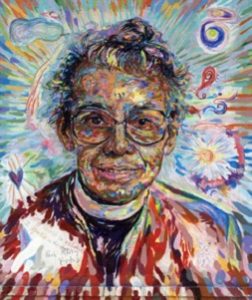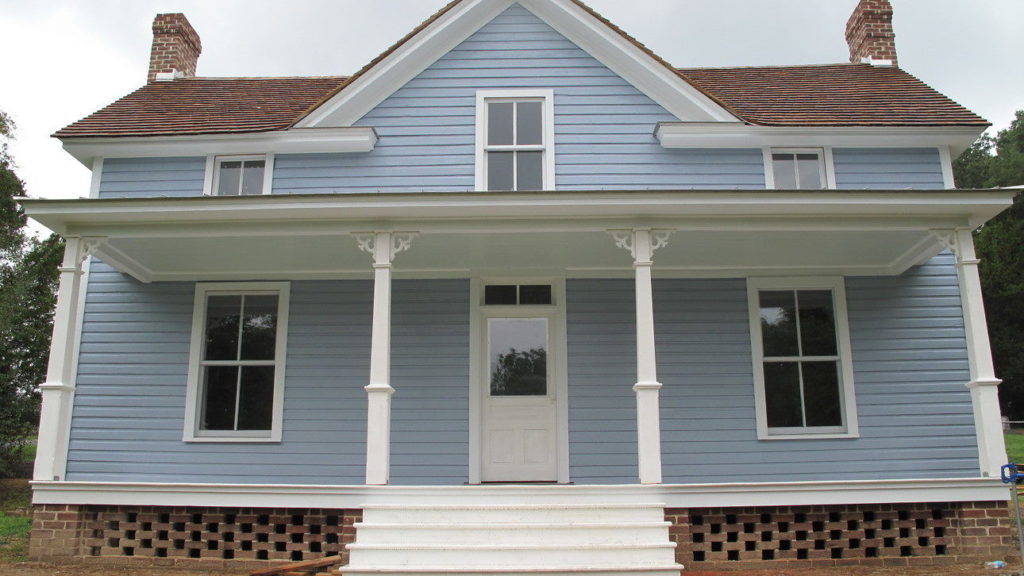It may be that when historians look back on twentieth-century America, all roads will lead to Pauli Murray. . . . Civil rights, feminism, religion, literature, law, sexuality—no matter what the subject, there is Pauli Murray.[1]

“Pauli Murray in the World”, one of the Pauli Murray Murals at 117 S. Buchanan Boulevard, Durham NC. Photo: EJ Richardson
Anna Pauline (Pauli) Murray (1910-1985), noted activist, lawyer, professor, poet, and the first African-American woman to become an Episcopal priest, was sponsored for ordination by Emmanuel. She had begun attending Emmanuel when she came to Brandeis in 1967, and served on our vestry. Having recently lost her partner Renee Barlow to brain cancer in 1973, she sought solace in her faith. The Rev. Alvin L. Kershaw helped her discern a call to ordination. Murray was accepted as a postulant for Holy Orders by the Rt. Rev. John M. Burgess, bishop of the Diocese of Massachusetts and first African American diocesan bishop in the Episcopal Church.
Leaving a tenured professorship at Brandeis University in 1973, Murray entered the General Theological Seminary in New York City. While there, she was both an advocate of diversity and a vocal challenger of seminary practices. She subsequently decided to complete her last year at Virginia Theological Seminary, where the faculty was more supportive of women’s ordination. [2] In 1975, she requested that her candidacy be transferred to the Episcopal Diocese of Washington. She was ordained to the priesthood at the Washington National Cathedral on January 8, 1977, by the Rt. Rev. William F. Creighton, and was celebrated in the press as the first African American woman to become an Episcopal priest.
In another first, she celebrated the Eucharist at the Chapel of the Cross, Chapel Hill, NC, as the first woman to do so in North Carolina. (The Episcopal Archives’ Leadership Gallery features video coverage of Murray offering the Eucharist in her grandmother’s church, which was published in 1985 by the television series On the Road). Pauli described her thoughts about the service, which was attended by our Parish Historian Mary Chitty, in these words:
Whatever future ministry I might have as a priest, it was given to me that day to be a symbol of healing. All the strands of my life had come together. Descendant of slave and of slave owner, I had already been called poet, lawyer, teacher, and friend. Now I was empowered to minister the sacrament of One in whom there is no north or south, no black or while, no male or female—only the spirit of love and reconciliation drawing us all toward the goal of human wholeness. [3]
Given her age, gender, and race, Murray was unable to find a position as a parish priest in Massachusetts, New York, or Washington. She creatively used her strengths and weaved together a ministry of various roles and activities. Her service as minister without portfolio in Washington, DC, where she filled in for services at St. Stephen, the Incarnation Church, and the Episcopal Church of Atonement, was supplemented by volunteer pastoral care, and lecturing on college campuses, to women’s groups, and at conferences. With proceeds from the second edition of her book Proud Shoes, she purchased a car and traveled the East Coast, giving sermons, lectures, and interviews. [4] Her writings at that time, which emphasized diversity and reconciliation, reflected a culmination of her life’s work.
After a short time as priest-in-charge at Holy Nativity (Baltimore), Murray moved to Pittsburgh with Maida Springer Kemp. Her last year was spent traveling, crossing the country to Seattle, where she gave the keynote address to the Seattle Urban League’s Annual Dinner. After attending the Wingspread (Wisconsin) Consultation of Black Women in preparation for the Nairobi Conference in 1985, she marked the close of the Women’s Decade and the Eleanor Roosevelt Centennial celebrations at Vassar College. At the time of her death that year from pancreatic cancer, Murray was revising her autobiography. [5]
Murray was born in Baltimore on Nov. 20, 1910, and raised by her mother’s family in Durham NC. The banner image above shows the roof of the Murray Family Home, which was declared a National Historic Landmark in 2016. For more about her illustrious life, please see her Wikipedia entry, her autobiography, and numerous biographies listed on our pages linked above right.

The Pauli Murray Home in Durham NC is managed by the National Park Service and the P.M. Center for History & Social Justice, Duke University.
- Susan Ware, “Pauli Murray’s Notable Connections,” Journal of Women’s History 14(2), Summer 2002.
- Rosalind Rosenberg. Jane Crow: The Life of Pauli Murray. New York: Oxford, p. 366.
- Pauli Murray. Song in a Weary Throat: An American Pilgrimage, reprinted as The Autobiography of a Black Activist, Feminist, Lawyer, Priest, and Poet. Knoxville: University of Tennessee Press, 1987, p. 435.
- Pauli Murray. Proud Shoes: The Story of an American Family. NY: Harper, 1956.
- Rosenberg, Jane Crow, pp. 384-385.

